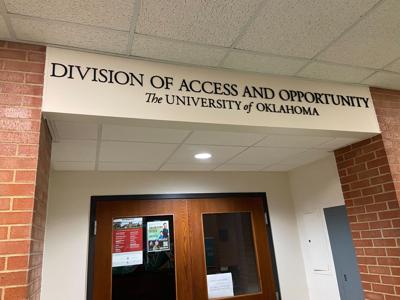While OU students were gone for spring break, the letters above the previously named Division of Diversity, Equity and Inclusion office in Copeland Hall were replaced with "Division of Access and Opportunity," representing a broader shift away from DEI in compliance with Gov. Kevin Stitt's executive order.
In December, Stitt signed an executive order calling for a formal review of DEI in Oklahoma higher education to be completed by May 31.
Among other stipulations, the order prohibits state agencies and institutions for higher education from using state funds, property or resources to "grant or support diversity, equity and inclusion positions, departments, activities, procedures, or programs to the extent that they grant preferential treatment based on one person's race, color, sex, ethnicity, or national origin over another's."
In the months since, OU President Joseph Harroz Jr. has declared no staff would be terminated as a result of the executive order, but that the Division of Diversity, Equity and Inclusion would change its function and name to the Division of Access and Opportunity.
During a March OU Board of Regents meeting, Harroz announced Belinda Higgs Hyppolite, vice president for diversity and inclusion and chief diversity officer, will now serve as vice president for access and opportunity with no changes in salary. This was the only item relating to DEI on the meeting's agenda.
"We continue to implement and work on how do we honor and live by the executive order, while continuing to make (OU) a place of belonging," Harroz said at the March meeting.
As the university continues to find ways to comply with the executive order while still fostering a place of belonging, Harroz said they will look closely at how to help first-generation students and Pell Grant recipients.
In a campus-wide email sent in February, Harroz wrote the university has been assessing the possible implications of the executive order and engaging with the campus community and key stakeholders. In addition to the office name change, Harroz wrote DEI-related positions will end and the staff members will take on new roles due to these changes. It remains unclear when and how the changes will occur.
"The easy thing would be to just simply say, 'We're going to comply,' and then just sort of look away," Harroz said. "That's not what we're doing."
On the state level, four bills authored by Sen. Rob Standridge (R-Norman) aimed at eliminating DEI practices in Oklahoma higher education institutions did not advance from the floor of their origin before the March 14 deadline.
Standridge's bills are unlikely to move forward. However, presumed dead bills can come back through various legislative maneuvers.
Senate Bills 1303, 1304, 1305, and 1306 were introduced in February by Standridge after the senator hosted an interim study in October looking at DEI practices in higher education. At the study, guests from the conservative think tank Heritage Foundation, Goldwater Institute and the Oklahoma Council of Public Affairs, along with other experts, discussed "how DEI is destroying our institutions of higher learning and harming many college students and faculty along the way," according to the Oklahoma Senate.
Senate Bill 1303 called for institutions of higher education governing boards to ensure certain actions related to diversity, equity and inclusion do not occur. These actions include establishing or maintaining a DEI office, hiring employees or third parties to perform DEI duties and giving preferential treatment based on the provision of a diversity, equity and inclusion statement. The bill would also prohibit institutions from requiring DEI training as a condition for enrollment or participation in any institutional function.
Senate Bill 1304 would have created the Oklahoma Workforce Education Revolving Fund under the administration of the Oklahoma Department of Commerce. The department would use the fund to provide financial aid to eligible higher education institutions complying with certain diversity, equity and inclusion practices and policies.
Senate Bill 1305 would have prohibited higher education institutions from requiring or incentivizing participation in DEI and critical race theory-related courses or content, which includes topics such as systemic racism, gender identity or social justice.
Senate Bill 1306 would have barred institutions of higher education from requiring enrollment in certain courses not part of their core curriculum, such as OU"s Gateway to Belonging class. For voluntary course work, the bill would require those courses to make public any materials, slides or books used in the course.
Additionally, House Bill 3217, authored by Rep. Kevin West (R-Oklahoma City) and introduced in February, did not make it out of committee. Known as the Patriotism Not Pride Act, the bill would ban state agencies from displaying pride flags on state property or using funds to observe Pride Month.
These bills are part of a larger country-wide effort to eliminate DEI initiatives in higher education. According to reporting by the Associated Press, this year Republican lawmakers have proposed about 50 bills in 20 states that would restrict DEI initiatives or require their public disclosure. Conversely, Democrats have filed about two dozen bills in 11 states that would require or promote DEI initiatives, according to AP.
This story was edited by Anusha Fathepure and Peggy Dodd. Kylie Caldwell and Grace Rhodes copy edited this story.


